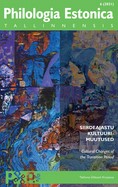Looduse-kultuuri ökokriitiline ümbermõtestamine Andrus Kivirähki ja Monique Roffey teoste näitel
Ecocritical rethinking of nature-culture on the example of Andrus Kivirähk’s and Monique Roffey’s works
Author(s): Maris Sõrmus, Suliko LiivSubject(s): Comparative Study of Literature, Estonian Literature, Theory of Literature, British Literature
Published by: Tallinna Ülikooli Kirjastus
Keywords: Andrus Kivirähk; Monique Roffey; material ecocriticism; anthropocentrism; agency; natureculture; transcorporeality; posthumanism;
Summary/Abstract: This article focuses on how nature and culture are transformed beyond recognition in contemporary British-Caribbean (Monique Roffey) and Estonian literature (Andrus Kivirähk), shattering the anthropocentric core of the concepts of agency, body, and voice. Situated in the new materialist paradigm, we follow on from such re-conceptualisations in material ecocriticism. In line with this view, Roffey and Kivirähk mingle nature with humans as a subject, threatening anthropo-normativity. Being articulate and bodily, nature emerges as a cultural creature, uncannily entangled with culture, as in Roffey’s “The White Woman on the Green Bicycle” (2009). Further compelling is the naturalisation of culture in “Sun Dog” (2002): the human body forming a porous natural-cultural body. Nature and culture truly collapse, suggesting the posthuman body as a material-discursive phenomenon. The novelists furthermore suggest the blurring of human and nonhuman languages: the emergence of nature as articulate and the view of humans as natural creatures. In “Mees, kes teadis ussisõnu” (“The Man Who Spoke Snakish”, 2007), anthropocentrism is finally dissolved in merging nature and culture and suggesting their intraactive becoming. Both writers thus compellingly indicate that agency, voice and body are not singularly human but span the natural world around us.
Journal: Philologia Estonica Tallinnensis
- Issue Year: 6/2021
- Issue No: 1
- Page Range: 75-97
- Page Count: 23
- Language: Estonian

